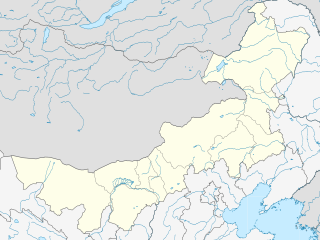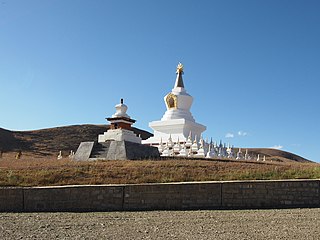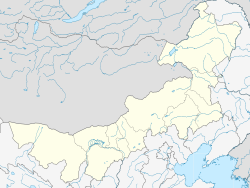
Inner Mongolia or Nei Mongol, officially the Inner Mongolia Autonomous Region or Nei Mongol Autonomous Region (NMAR), is one of the autonomous regions of the People's Republic of China, located in the north of the country. Its border includes most of the length of China's border with Mongolia. The rest of the Sino–Mongolian border coincides with part of the international border of the Xinjiang autonomous region and the entirety of the international border of Gansu province and a small section of China's border with Russia. Its capital is Hohhot; other major cities include Baotou, Chifeng, and Ordos.
Evenki or Evenk may refer to

Autonomous administrative divisions of China are specific areas associated with one or more ethnic minorities that are designated as autonomous within the People's Republic of China (PRC). These areas are recognized in the Constitution of China and are nominally given a number of rights not accorded to other administrative divisions. For example, Tibetan minorities in Autonomous regions are granted rights and support not given to the Han Chinese, such as fiscal and medical subsidies.

Jiuquan, formerly known as Suzhou, is a prefecture-level city in the northwesternmost part of Gansu Province in the People's Republic of China. It is more than 600 km (370 mi) wide from east to west, occupying 191,342 km2 (73,878 sq mi), although its built-up area is mostly located in its Suzhou District. Its population was 962,000 in 2002.
Sum, sumu, sumon, and somon are a type of administrative district used in China, Mongolia, and Russia.

Golmud, also transliterated as Ge'ermu, Geermu or Nagormo, is a county-level city in Qinghai Province, China, bordering Xinjiang to the northwest and the Tibet Autonomous Region to the southwest. Administrated by Haixi Mongol and Tibetan Autonomous Prefecture, it is the second largest city in Qinghai and the third largest in the Tibetan Plateau. The population is now about 205,700. The name of the city derives from Mongolian, and its literal meaning in the local Western Mongolian is "Rivers".

Dorbod (Siziwang) Banner is a banner in the Ulanqab region of Inner Mongolia, China, bordering the Republic of Mongolia's Dornogovi Province to the northwest. It is located about 80 km (50 mi) north of Hohhot, the capital of Inner Mongolia.
Uyunqimg or Oyunchimeg is a retired Chinese politician of Mongolian ethnicity. Between 2008 and 2013 she served as a Vice-Chair of the Standing Committee of the National People's Congress, the national legislature. Between 2000 and 2003 Uyunqimg served as Chairwoman of Inner Mongolia. She is the highest ranked woman of ethnic minority background to have served in the Chinese government in the history of the People's Republic.
There is a small community of Mongolians in Japan, representing a minor portion of emigration from Mongolia. As of December 2014, there were 5,796 registered Mongolian citizens residing in Japan, according to the Ministry of Foreign Affairs, up from 2,545 in 2003.

Yili Group is a state-owned company of dairy industry in China. It is engaged in processing and manufacturing of milk products, including ice cream, milk tea powder, sterilized milk and fresh milk under "Yili" brand, powdered milk under "Pro-Kido" brand, and organic milk under "Satine" brand. It is headquartered in Hohhot, Inner Mongolia. Its main competitor in China is Mengniu. In 2018, it is the world's 3rd best-performing food brands.

Honggor Sumu is a sumu in the Sonid Left Banner of Xilin Gol League, Inner Mongolia, China. In 2000, it had 1621 inhabitants. It is located in high desert only 38 kilometres (24 mi) from the border with Mongolia.

Horinger is a county of Inner Mongolia, China, bordering Shanxi province to the southeast. It is under the jurisdiction of Huhhot.

Jiagedaqi or Jagdaqi is a district and the seat of Daxing'anling Prefecture, Northeast China. Its physical location is in Inner Mongolia; however, it is under the jurisdiction of Heilongjiang Province.

Daocheng County or Dapba in Tibetan, historically Daoba, is a county of western Sichuan Province, China, located in the eastern Hengduan Mountains. It is under the administration of the Garzê Tibetan Autonomous Prefecture with an overwhelmingly Tibetan population. Its latitude ranges from 27° 58' to 29° 30' N and longitude 99° 56' to 100° 36', and reaches 174 kilometres (108 mi) in north-south extent and 63 km (39 mi) in east-west width, with elevations ranging from 2,000 to 6,032 m.
Gangnan is a district of Guigang, Guangxi, People's Republic of China, covering part of the southern portion of the city.

Shuangliao is a city in western Jilin, People's Republic of China, bordering Liaoning and Inner Mongolia. It is under the administration of Siping City.

Jungar Banner is a banner of western Inner Mongolia, People's Republic of China, lying on the western (right) bank of the Yellow River and bordering the provinces of Shanxi to the southeast and Shaanxi to the southwest. It is under the administration of Ordos City.

The Evenk Ethnic Sumu is an administrative subdivision in the northeastern part of Old Barag Banner in Hulunbuir, Inner Mongolia. It has an area of 6,037 km2 (2,331 sq mi) and, as of 2010, a population of 2665 of which 1560 (54.4%) are ethnic Evenks.













